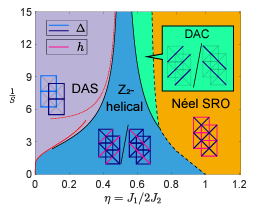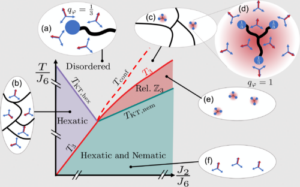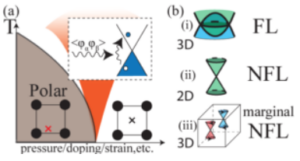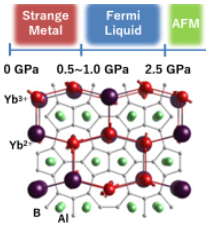My Research
Premala (“Premi”) Chandra is fascinated by rich phases of quantum matter that emerge from the confluence of quantum mechanics and complexity. In these strongly correlated materials, interactions are significant, and their competing effects often result in novel quantum  orderings and quantum dynamics. Premi’s research interests include frustrated magnetism unconventional superconductivity in dilute polar metals, novel metallic states near quantum phase transitions and more recently light-driven phase transitions and dynamical behaviors that are inaccessible in equilibrium. She also loves experimental enigmas and enjoys developing phenomenological descriptions to understand and to characterize them. Finally, Premi is committed to outreach towards sharing her scientific enthusiasm with the greater public, and towards developing a welcoming and inclusive research community.
orderings and quantum dynamics. Premi’s research interests include frustrated magnetism unconventional superconductivity in dilute polar metals, novel metallic states near quantum phase transitions and more recently light-driven phase transitions and dynamical behaviors that are inaccessible in equilibrium. She also loves experimental enigmas and enjoys developing phenomenological descriptions to understand and to characterize them. Finally, Premi is committed to outreach towards sharing her scientific enthusiasm with the greater public, and towards developing a welcoming and inclusive research community.
Here is a sample for her recent projects to give a flavor for her activities:
Theoretical Research Areas
Spin systems with competing interactions are “economy” strongly correlated systems. Fluctuation-selection from degenerate ground-state manifolds can lead to novel non-local phases.
Emergent Helical Order in a Frustrated Spin Nanotube
 An integrated analytic and computational approach, was used to identify and and characterize a fluctuation-induced quantum ordering transition. The topological character of the emergent phase was analyzed using entanglement spectra and non-local string order parameters.
An integrated analytic and computational approach, was used to identify and and characterize a fluctuation-induced quantum ordering transition. The topological character of the emergent phase was analyzed using entanglement spectra and non-local string order parameters.

Metals close to quantum critical points are strongly correlated systems that often exhibit non-Fermi liquid behavior and other exotic orderings including unconventional superconductivity.
Unconventional Superconductivity in Dilute Quantum Critical Polar Metals

A mechanism for superconductivity in dilute quantum critical polar metals is studied where the electron pairing is mediated by energy fluctuations; comparison to existing data is made and predictions for future experiments are made.
Multiband Quantum Criticality of Polar Metals

It is shown that multiband metals near inversion symmetry-breaking (polar) quantum critical points provide rich platforms for the exploration of strongly correlated physics including non-Fermi liquid phases.
Photoinduced Transitions and Dynamical Behaviors
 Motivated by recent measurements of pump-induced polar ordering, we analyze classical and quantum dynamics of a minimalist model that captures its observed features and leads to specific predictions for future experiment.
Motivated by recent measurements of pump-induced polar ordering, we analyze classical and quantum dynamics of a minimalist model that captures its observed features and leads to specific predictions for future experiment.
Collaborations with Experimentalists
Dielectric Relaxation by Quantum Critical Magnons

It is shown experimentally that quantum critical magnons, the elementary excitations of a magnetic material near a quantum phase transition, can demonstrate electric dipole activity as observed in anomalous dielectric relaxation.
Observation of a Critical Charge Mode in a Strange Metal

Using synchrotron Mossbauer spectroscopy, the first direct observation of slow critical charge fluctuations in a strange metal is reported; strange metals cannot be characterized by conventional theoretical approaches. These artificial charge fluctuations may prove to be a signature of strange metals that should be included in their description.
Outreach:
In order to learn more about Premi’s research activities please visit the arXiv.